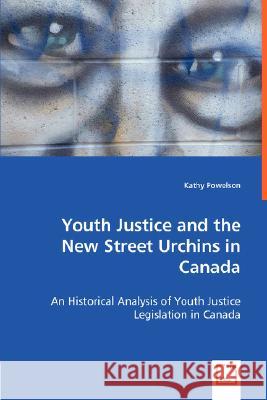Youth Justice and the New Street Urchins in Canada » książka
Youth Justice and the New Street Urchins in Canada
ISBN-13: 9783639013894 / Angielski / Miękka / 2008 / 136 str.
Over the last ten years, the number of street youth in Canadian cities has increased significantly. Concerns have been raised about how best to manage this group, many of whom are homeless, drug-addicted, HIV-infected and/or involved in the sex trade. It has fallen to provinvical governments to respond with new legislation and policy to regulate these "new street urchins," and the provincial statutes are similar, in many respects, to legislatino linked with child-saving reforms at the beginning of the 20th Century. Ironically, this old legislation was introduced to deal with a comparable group of troublesome, urban, "street urchins." The work of Cohen's (1985) and especially his notions of patterns of social control ar used to explain the unintended consequences of reforms that began in the 1960s and that have resulted in the new provincial youth control legislation.
Over the last ten years, the number of street youth in Canadian cities has increased significantly. Concerns have been raised about how best to manage this group, many of whom are homeless, drug-addicted, HIV-infected and/or involved in the sex trade. It has fallen to provinvical governments to respond with new legislation and policy to regulate these "new street urchins", and the provincial statutes are similar, in many respects, to legislatino linked with child-saving reforms at the beginning of the 20th Century. Ironically, this old legislation was introduced to deal with a comparable group of troublesome, urban, "street urchins." The work of Cohens (1985) and especially his notions of patterns of social control ar used to explain the unintended consequences of reforms that began in the 1960s and that have resulted in the new provincial youth control legislation.











